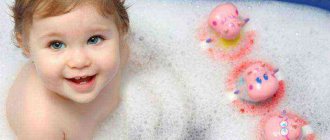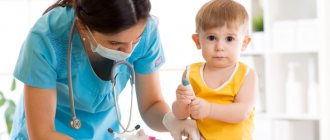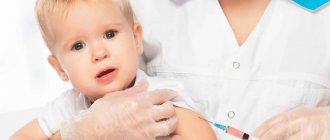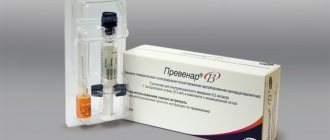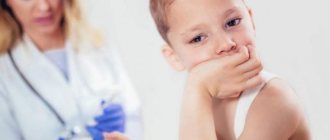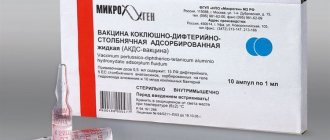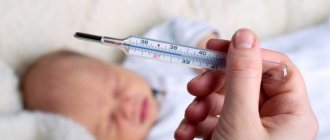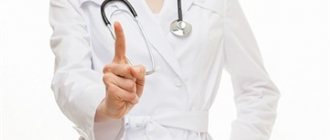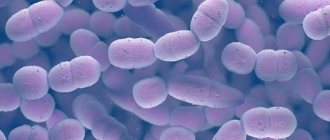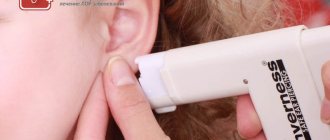As a rule, after vaccinations with BCG, Hepatitis B, Mantoux, Prevenar, doctors strongly recommend that children not take baths for 1-2 days. Indeed, during bathing, a virus or bacteria can enter the place of the body where the injection was given, which can cause a number of negative health consequences.
The Prevenar vaccination is a vaccination against streptococcal and pneumococcal bacteria that cause infections in the human body, as well as pneumonia. Therefore, we will find out later whether it is possible to swim after vaccination with Prevenar.
Vaccination Prevenar 13 - protecting the child’s body from pneumococcal infections
In recent years, the greatest danger to the life and health of children has been posed not by rare and dangerous viruses, but by the most common pneumococci.
These bacteria have developed powerful immunity to most antibiotics. What does it mean? They have become much more resistant to treatment, and therefore much more dangerous for children. And most importantly, the younger the child, the more dangerous pneumococcus is for him, because immunity has not yet been developed.
What to do? The danger is real, because in order to develop immunity, a “meeting” of the body with a bacterium is necessary, and not every immune system can survive such a meeting. The answer is simple - vaccinate. The most reliable vaccine against pneumococcus today is Prevenar.
What is Prevenar
First of all, it is worth knowing that the Prevenar 13 vaccine is the only one approved by experts in the European Union. This means that it is as purified as possible, clinically studied, and as safe as a vaccine can be. Clinical trials of Prevenar showed an increase in antibody titres in 70% of children. This is 70% more immunity. Also, the Prevenar 13 vaccine has received positive reviews from doctors.
Pneumococcal infections are a group of infectious diseases that are caused by bacteria of the genus Streptococcus pneumoniae.
These include:
- tonsillitis;
- pneumococcal pneumonia;
- bacterial otitis;
- meningitis.
A vaccine is a preparation containing a greatly weakened pathogen (antigen). As mentioned earlier, in order for a person to receive immunity from a disease, the body must have contact with its pathogen. This is possible in two cases: through disease and vaccination.
The first way can be dangerous, since the disease is caused by a strong, uncontrollable pathogen. Vaccination allows the body to receive the antigen for recognition in a safe amount and in a greatly weakened form, which eliminates the risk of a full-blown disease.
Indications for vaccination
Indications for Prevenar vaccination are preventive measures against all diseases caused by bacteria Streptococcus pneumoniae serotypes 4, 6B, 9V, 14, 18C, 19F and 23F.
Prevention is carried out from the age of two months to five years inclusive. When administering the Prevenar vaccination, the instructions are required to be studied by both parents and health care workers.
Features of the procedure
Prevenar is a vaccine for intramuscular administration. In many developed countries (USA, Scandinavian countries), Prevenar is mandatory.
Children under two years of age are vaccinated in the anterolateral thigh. For children over two, the vaccine is given in the deltoid muscle of the shoulder.
It is acceptable to administer Prevenar simultaneously with other vaccines. An exception is the BCG test, since an increase in antibodies after vaccination will be reflected in the BCG reaction and its interpretation will be incorrect.
However, when introducing, 3 important conditions must be adhered to:
- Do not mix Prevenar with other vaccines.
- All vaccines must be given to different areas of the body.
- Do not administer intravenously.
Actually, there are no difficulties. The main thing is to find a sufficiently responsible and experienced doctor who can be trusted with this procedure.
Vaccination schedule
Of course, a prerequisite for vaccination is compliance with the following schedule:
- Children from 2 to 6 months are vaccinated according to the 3+1 scheme. The dose contains 0.5 ml of vaccine. The first 3 doses are given at intervals of more than a month, the last at 15 months of age;
- for children from 7 months to one year (11 months), the vaccine is administered in a similar dose, but according to a 2+1 scheme, at similar intervals; the last injection is made in the second year of life;
- from one year to 23 months, the vaccine is administered in the same dose, 0.5 ml, but only 2 times at two to three month intervals;
- at the age of 24 months to 5 years, they are vaccinated once in a dose of 0.5 ml.
During vaccination, the child must be healthy and examined.
Rules of conduct after vaccination with Prevenar
Streptococci are present in almost every person. When the body is healthy, these microorganisms often cannot harm it. However, if a child’s immunity deteriorates for any reason, they can cause the development of many serious diseases, including: meningitis, otitis media, bronchitis, pneumonia, and so on. Children under 5 years of age most often suffer from streptococcal infections. To eliminate such complications, the Prevenar vaccine was developed. In this article we will talk about how to behave after Prevenar vaccination and other nuances.
Contraindications to Prevenar
Despite the high effectiveness rates, there are certain conditions and conditions under which vaccination with Prevenar is not possible.
These include:
- increased sensitivity to the vaccine due to previous administration;
- presence of sensitivity to diphtheria toxoid;
- any disease (acute) at the time of vaccination.
Prevenar is also not used in adults, children with HIV and congenital infections. Regarding the latter, it is necessary to consult a pediatrician and a pediatric infectious disease specialist.
Reactions: the body and parents
After receiving the Prevenar vaccine, there will be a reaction to the vaccine in any case. Although the pathogen is weakened, in order to develop immunity, it must react as an antigen with an antibody in human blood. This means that, although in a mild form, the child will get over it.
There are several signs of a normal reaction to Prevenar:
- thickening, redness at the injection site (this will happen after any injection - this is normal);
- moderate increase in temperature to 37–37.5;
- moodiness, anxiety, lethargy, temporary refusal to eat;
- chills due to fever.
These reactions are normal and subside within a few days. At this time, the child needs to be kept calm. Contacts with other children should be limited, and visits to preschool should also be limited. Every 3 days the child should be shown to the pediatrician.
What reaction is considered abnormal?
There are criteria here too:
- temperature above 38°C;
- increasing reaction one day after administration;
- disturbances of consciousness (fainting, delirium);
- the appearance of severe inflammation at the injection site.
If any of these symptoms appear, you should consult a doctor. High temperature can be either an individual reaction within normal limits or a pathological condition.
When should you not go for a walk after vaccination?
Experts have differing opinions as to why walking is allowed or not recommended. Some claim that staying outside is fraught with fever, while others say that at home the risk of getting sick is higher.
First, let's figure out what the risk of the disease is associated with. The introduction of a weakened pathogen causes an immune response, which can be manifested either by increased susceptibility of the body to diseases or by an acute immune reaction.
It may seem that walking is dangerous, because there is a risk of catching a virus or catching a cold, but in fact, good ventilation in this case is much more useful and necessary than stuffy apartment air. It’s definitely not possible to convert in a stuffy, dusty apartment after vaccination.
When is walking contraindicated? If the vaccination was not carried out in accordance with the instructions, the child was sick or his reaction is pathological, it is necessary to refuse walks, call a doctor and find out if such a reaction occurs. If it is a common respiratory infection and no complications arise, you can go for a walk.
Signs of a pathological reaction include:
- temperature above 39 degrees;
- respiratory phenomena;
- allergic reactions;
- nervous irritability than for more than three days after vaccination;
- refusal to eat;
- any manifestations of respiratory failure.
A slight increase in temperature and anxiety in the first days are not pathological reactions and allow time in the fresh air.
In order to protect your baby during a walk, you do not need to overly insulate him; this will only cause excessive sweating. It is also better to refrain from contact with other children for some time. When the period of increased reactivity passes, you can safely go outside.
The characteristics of the vaccine itself also matter. And the reaction to it may be the reason why you should not walk with your child after vaccination:
- DPT usually causes an acute temperature reaction with peaks of up to 38 degrees in the first day after vaccination.
- The hepatitis vaccine normally does not cause reactions, so their appearance should alert you.
- The polio vaccine can cause allergic reactions that can be treated with antihistamines such as Fenistil.
- Vaccines against measles, rubella and mumps have specific reactions - reactions develop in the second week, you should not be afraid of this.
- Influenza vaccinations can cause severe temperature reactions and even respiratory syndrome (cough, runny nose).
Is it worth getting the Prevenar vaccine and what do you need to know about it?
Currently, a large number of viruses and infections pose a threat to children's health. pneumococci occupy not the last place . They constantly mutate and become resistant to antibiotics and old vaccines. The younger the child is, the more destructive pneumococcus is for him. In Russian clinics, doctors very often offer to vaccinate children with Prevenar. Since vaccination is voluntary, parents are faced with the question: is it worth getting this vaccination or not?
Why is pneumococcus dangerous?
Pneumococcus is a gram-positive streptococcus bacteria . Every person has them and lives in the upper respiratory tract, but under a number of factors (decreased immunity, exacerbation of chronic diseases, the occurrence of colds, etc.), these bacteria provoke the development of diseases, such as:
- Pneumonia and pleurisy.
- Acute otitis media (inflammation of the middle ear).
- Meningitis (inflammation of the membranes of the brain).
- Infectious arthritis.
- Septic endocarditis (damage to the lining of the heart).
In serious forms of the disease, death is possible, especially in young children.
Therefore, in order to avoid the sad consequences of the disease, doctors in our country, as well as in some European countries, recommend vaccinating a child with Prevenar, and this vaccine is included in the vaccination calendar.
However, parents should understand this issue in more detail before vaccinating their child.
Pros and cons of vaccination
The positive aspects of vaccination are based on the principle of action of any vaccine. It is a suspension that contains a weakened pathogen - antigen . When it enters the blood, leukocytes are activated, and the body’s fight against the harmful factor begins - the process of producing antibodies. These antibodies remain in the human body for quite a long time, and in the event of a real infection, the immune system is already fully prepared to fight it.
- After successful vaccination, the immune system begins to fight the injected virus, thereby producing antigens that are stored in immune memory .
- After contracting a pneumococcal infection, the vaccinated person’s immunity comes into play , the memory of which already has a “method of fight” - antigens, and the fight against bacteria occurs faster.
- In a vaccinated child, the disease, if infected, occurs in a milder form , recovery occurs much faster and without possible subsequent complications.
- Vaccination with Prevenar will help protect the child from possible complications , and in some cases helps to avoid death.
- Infants are most often susceptible to various diseases. And since their immunity has not yet been formed, timely vaccination can protect the baby from diseases caused by pneumococcal bacteria (otitis media, meningitis and pneumonia).
- The medications that an unvaccinated child will need to take to treat pneumococcal disease are several times more dangerous to health than possible complications after vaccination with Prevenar.
- There are very few contraindications to the use of the Prevenar vaccine.
- Children under two years of age have an increased risk of developing swelling of the airways and lungs due to pneumonia, which very often leads to death. Pneumonia also entails otitis media, which can result in complete deafness. Vaccination with Prevenar will help avoid this in 90% of cases.
- Vaccination is included in the national vaccination calendar, so it can be done absolutely free of charge at a public clinic.
But not everything is so rosy, there are also negative aspects:
- Like any other vaccine, Prevenar can cause an allergic reaction : skin irritation and rashes, fever, itching, diarrhea, nausea, vomiting, weakness and lethargy, the child becomes capricious.
- More severe reactions of the body are also possible , which are indicated in the instructions for the drug: anaphylactic shock, Quincke's edema and bronchospasm.
- The vaccine is not a 100% guarantee that a child will not get pneumococcal diseases.
- Many parents noted that after vaccination with Prevenar, the incidence of illness in their children did not decrease, and in some cases, on the contrary, the child began to get sick more often .
- The vaccine has a number of contraindications that must be taken into account before vaccination: an individual reaction with increased sensitivity that appeared during the previous administration of the vaccine; high sensitivity to the excipients included in the product, as well as to diphtheria toxoid; acute diseases of infectious and non-infectious types; exacerbation of existing chronic pathologies (requires waiting for a period of remission).
- In most cases, diseases caused by pneumococcus, with timely intervention, are easily treatable without vaccination .
- Repeated booster vaccination is required according to the national vaccination schedule.
- In each individual case, the body’s reaction to the vaccine may be different : some may not even develop a fever, while others may end up in the hospital with a severe allergic reaction.
Is it possible to go for a walk after vaccination?
An equally pressing issue for discussion is the question of whether it is possible to go for a walk after vaccination with Prevenar. And this is not surprising, because every parent tries to do everything to ensure that the period after vaccination passes without complications.
Many doctors advise staying at home during this period - this time can vary from 1 to 3 days.
In fact, it is very advisable to go for a walk after Prevenar vaccination. There is nothing better than a walk in the fresh air in your free time. For example, you can walk to the clinic and back.
After vaccination, the body's immune system should become stronger over time, thanks to the production of new antibodies that can resist pathogenic bacteria. Many parents prefer not to overload the developing immune system with walks during this period. However, this approach is completely wrong, because it is fresh air along with active pastime that strengthens the immune system and contributes to the fastest possible absorption of the vaccine.
In reality, there are much more microorganisms in a closed room than in a crowded place. This is because apartments very often, especially in cold weather, are practically not ventilated, the air turns out to be stale and unsterile. The fibers of carpets, upholstered furniture and any soft toys contain an incredible amount of dust and various microbes. While staying in such a room, there is a high probability that the child will inhale some pathogenic microorganism, which will most likely contribute to the development of a cold. Constant dry air causes the baby's nasal mucosa, mouth and throat to dry out - and this is the easiest way for germs to enter the body. Therefore, it is at home that the likelihood of catching some kind of infection is much higher than on the street.
When can a child be bathed after vaccination? Swimming after vaccination
From birth, children are vaccinated against various diseases and viruses for preventive purposes. After the vaccination is administered, the nurse who administers the vaccination informs that it is forbidden to bathe the child for at least 24 hours. But many parents are wondering - is this really so, does this rule apply to all vaccinations? Happykids will try to answer all these questions in the most detailed way.
Why are vaccinations needed?
The vaccine is aimed at increasing immunity and helping the body resist diseases. With it, bacteria and viruses enter the child’s body in small volumes, which can be either living or dead pathogens. Thanks to this, the baby’s immunity is activated, antibodies resistant to the disease appear, and he begins to protect himself from the disease.
As a result of vaccination, the child’s body experiences severe stress. Therefore, to avoid complications, doctors recommend not bathing the baby for at least the first day after vaccination.
By the way, on our website there is a very interesting article for parents whose children are afraid to swim in the bathroom.
How many days should you not walk after Prevenar vaccination?
What difference does it make whether I vaccinate my child or not?
Infectious diseases make up a significant portion of all childhood diseases. Many of them are very difficult and lead to serious complications, including death.
Vaccination is a reliable protection for children.
Vaccination prevents the spread of infection and the return of dangerous infections that were defeated thanks to it.
In order for the infection to stop circulating, the majority need to be vaccinated. This is called herd or mass immunity.
The more people are vaccinated, the more people in the population are immune to infections. The higher the herd immunity, the lower the likelihood of getting sick during an encounter with a virus or bacteria. If 90% of people are vaccinated, the remaining 10% will not get sick.
How does the vaccine work? What is it for?
First, let's figure out what the vaccine is for? The vaccine helps the body produce antibodies, which in turn, when the body encounters an infection, will fight it and help the body get rid of the infectious agent.
In order to introduce the body to an infection and allow it to develop specific antibodies to this infection, either killed microbes, or fragments of microbes, viruses, or proteins or sugars from the outer surface of microbes are introduced into the body. Some vaccines contain live, weakened microbes or neutralized microbial toxins. Thus, the body gets acquainted with microbes and develops protection against them in advance and, when encountering an infection, knows how to defeat it.
Are vaccines safe and how is this tested?
Before a vaccine is used, it is carefully examined.
Each country has an authority that monitors the safety of vaccines.
Vaccine safety is controlled in 3 stages:
· At the development stage
· At the production stage (the manufacturer controls the safety of drugs at all stages of production)
· Certification (all vaccine products, including foreign ones, are subject to mandatory state certification. Without certification, vaccines are not allowed for sale).
· At the point of use (Rospotrebnadzor specialists monitor compliance with the rules for storage, transportation, and sale of drugs)
A vaccine that does not meet safety requirements is recalled and not allowed for sale.
Who decides which vaccinations need to be given? Where do doctors get their information?
Vaccination on the territory of the Russian Federation is carried out in accordance with the National Calendar of Preventive Vaccinations and Vaccinations for Epidemic Indications, approved by Order No. 125n dated March 21, 2014 by the Ministry of Health of the Russian Federation.
The calendar includes vaccination against potentially dangerous infections that can cause epidemics, be severe, and lead to death.
To date, the calendar includes vaccines against 12 infectious diseases: hepatitis B, tuberculosis, pneumococcal infection, diphtheria, tetanus, whooping cough, polio, hemophilus influenzae, measles, rubella, mumps, and influenza.
The national calendar regulates the timing of vaccine administration, which parents must comply with in agreement with the pediatrician.
All vaccines used in Russia are officially approved and are effective and safe.
If a child is sick with ARVI, can he or she delay receiving the vaccine?
This issue is being resolved with the pediatrician planning vaccination. Acute acute respiratory viral infections and acute intestinal infections are a temporary contraindication to vaccination. The vaccination is done after the body temperature has normalized and the symptoms of the disease have disappeared.
How do I know when my child's next vaccination is?
The local pediatrician or preschool or school doctor will inform you about the vaccination plan and the next administration of immunobiological drugs.
Is it possible to walk with my child after vaccination?
Walking in the fresh air after vaccination is possible if the child does not have a reaction to the administration of the drug in the form of an increase in temperature. It is not recommended to visit crowded places, or to come into contact with people who are sick with a particular infection. It is also recommended to postpone physical activity for the next 3-5 days.
There is an opinion that vaccines against measles, mumps, rubella cause autism, is this true?
Numerous studies have shown that there is no connection between vaccinations and autism. Vaccinations in general, and the measles, mumps and rubella vaccine in particular, do not cause autism.
Can a woman be vaccinated against influenza while breastfeeding?
Yes, breastfeeding women can receive any type of flu vaccine.
There is an opinion that it is better to get over the disease naturally rather than get vaccinated against them?
The difference between vaccination and natural infection is the price an infant pays to acquire immunity.
The price paid by children who are vaccinated is discomfort during vaccination (fear of injections).
The price infants pay when naturally infected is the likelihood of developing severe illness: paralysis, respiratory arrest (poliomyelitis), mental retardation (Haemophilus influenzae type b), liver failure (hepatitis B), deafness (mumps, meningococcal disease) or pneumonia (measles, chicken pox).
You should seriously think about the price your child will pay in acquiring immunity.
The dangers of water procedures
While swimming, a virus or bacteria may enter the injection site on the body, which can cause health problems. However, doctors associate the ban on swimming with the possibility of developing an allergic reaction: irritation, redness, rise in temperature.
There is also an opinion that while taking a bath there is a possibility of hypothermia and you can catch a cold. Based on this, most parents prefer not to bathe their child for one day after vaccination.
After vaccination, the following reactions are likely: fever, cough, sore throat. Swimming may provoke these consequences due to temperature changes. Some doctors recommend not washing children one day before vaccination and 2 days after, in order to avoid all possible side effects.
When deciding on bathing procedures after vaccination, you need to be guided by the general health of the baby. An increase in temperature, the appearance of a runny nose and cough, drowsiness, lethargy - all this is a reason to refuse swimming. But if, on the contrary, the baby is in excellent health, he is cheerful, cheerful and active, then you can afford to give him a bath.
Let's look at examples of which vaccinations it is or is not possible to bathe a child.
Preparation and actions after vaccination
When preparing for and after any vaccination, it is recommended:
- maintain a daily routine;
- do not introduce new products to the child’s menu;
- avoid contact with people who have infectious diseases;
- Avoid excessive overheating or hypothermia (active walks, baths or sleeping in the fresh air).
Immediately after the injection, you should remain in the medical facility for 30 minutes to monitor your body's reaction. If no allergic reactions or side effects are detected during this time, then you can safely leave.
To reduce the risk of individual allergic reactions, many doctors recommend giving antihistamines to a child 3 days before and 3-5 days after any vaccination.
Regardless of the fact of an increase in temperature, it is recommended to give the child an antipyretic in accordance with his age and body weight if:
- At the same time, whole-cell pertussis vaccine (DTP vaccination) is administered;
- convulsions (including febrile ones) were previously observed.
Vaccine recommendations
There are 2 rules that are important to follow if you decide to give your baby a bath on vaccination day: the injection site should not be rubbed or steamed.
The BCG vaccination is given in the maternity hospital. You can bathe your baby after being vaccinated against tuberculosis, but only when he does not have a fever. The main thing is that it is forbidden to rub or steam the injection site. The appearance of a rash, redness, swelling, pain, and even an abscess at the injection site is not considered a reason for refusing to swim. It is considered especially important to carry out bathing procedures after BCG vaccination in the summer, since the baby sweats, and sweat can cause additional irritation.
DTP is a preventive vaccination procedure against 3 infections dangerous to the baby: whooping cough, diphtheria and tetanus. The vaccination material can be domestic or imported, and reactions to vaccination are possible from any of them. Vaccinate with DTP 4 times: at 3, 4, 6 and 18 months. An adverse reaction during this vaccination is an increase in temperature to 38, and sometimes higher, degrees. In such situations, it is advised to take antipyretic medications. The body returns to normal within 3 days after vaccination.
Accordingly, bathing procedures under such conditions are prohibited. Only a day after the vaccination, if the temperature is not elevated, can you bathe the child. Before this, it is only allowed to wet the injection site, since this will not affect the body in any way. Also, in order to avoid potential complications after a heavy DTP vaccine, it is not recommended to bathe, even if the baby remains in good health after vaccination. This is done because delayed reactions of the body may develop.
Prevenar
Prevenar is a vaccination against pneumococcal infection, which can cause diseases: pneumonia, purulent meningitis, pleurisy, acute otitis media, arthritis and endocarditis. Prevenar may cause side effects such as:
- the appearance of a painful lump at the injection site;
- temperature rise;
- enlarged lymph nodes;
- diarrhea and vomiting;
- general deterioration of the condition: loss of appetite, drowsiness, irritability.
When should a child not go outside after vaccination?
The child must be monitored; any deviations in his behavior may indicate a complication after the vaccination. The walk must be postponed in the following cases:
- the temperature has risen, the thermometer shows more than 37.5 °C;
- the baby is capricious, does not play, gets tired quickly;
- no appetite;
- extremities are cold;
- enlarged lymph nodes;
- there is swelling, redness or rashes on the area of the body where the vaccine was administered.
After DTP vaccination
For 3 days after the vaccine is administered, all the baby’s defenses are aimed at fighting the new strain of the virus, so they may not be able to cope with an additional infection picked up by the child during a walk. After vaccination, most mothers have an irresistible desire to wrap up their child and put as much warm clothing on him as possible. This does not protect it from bacteria and viruses.
He overheats, sweats, and his temperature rises. This after DTP vaccination can cause complications.
In summer, in warm, windless weather, walking in deserted places is not dangerous. Comfortable air temperature for walking is 20-22 °C. In frost, wind, and rain, it is better to refrain from visiting the street. After DTP, you should not walk for 3 days, even with a slight increase in body temperature.
For hepatitis
If the child is healthy, then vaccination against hepatitis should not lead to a sharp increase in temperature. The child’s good health on the day of hepatitis vaccination allows him to go for walks as usual. There are also no restrictions on swimming.
From polio
The introduction of polio vaccine into the body is not accompanied by an increase in temperature. After vaccination against polio, a child can be taken out for walks without fear from the first day.
For rubella, mumps and measles
Water procedures and walks are allowed from the first day. Complications are possible, but their signs may appear only after 2 weeks. If the baby’s well-being worsens, it is necessary to show it to a doctor.
For the flu
The period of occurrence of complications lasts 72 hours (3 days). After getting a flu shot, you should follow these recommendations:
- Protect from active games and physical exercise for 2-3 days;
- postpone bathing for 2 days;
- you can go for a walk.
BCG
This vaccination is given to healthy children in the maternity hospital. The injection area is the left shoulder. The ban on water procedures is valid for 1 day. Starting from the 2nd day after vaccination, swimming is allowed. You cannot exert mechanical force on the injection site; water does not cause negative reactions.
Mantoux
This is not a vaccination, but a test; its result is checked after a few days. Until doctors have assessed the baby’s body’s reaction to the vaccine, it is impossible to wet the injection site, which means swimming is prohibited during this period.
"Diaskintesta"
The test is done to detect tuberculosis. Diaskintesta is not accompanied by high fever. Walking is not included in the list of restrictions; a child can go for walks from the day of vaccination.
"Pentaxim"
This type of vaccination does not exclude side effects. Their likelihood increases with revaccinations, since the number of antibodies in the baby’s body increases each time. According to statistics, most often the temperature rises after the 4th revaccination.
You need to refrain from walking for a day. If during this time there is no significant increase in temperature, walks can be resumed. It is advisable to be outside in good weather without rain, wind, or snow.
"Prevenar"
You can go for a walk, but do not allow communication with other children. For a baby, any contact with a person who is a carrier of pneumococcal infection is dangerous. You cannot bathe for 24 hours after Prevenar vaccination.
Can be bathed
There are vaccines, after administration of which there are no side effects. After these vaccinations, you can bathe your child immediately. These include vaccinations against diseases:
- polio;
- BCG;
- rabies;
- yellow fever;
- rubella;
- tetanus;
- measles;
- viral hepatitis B;
- mumps;
- hemophilus influenzae;
- diphtheria;
- cholera.
So, swimming after vaccination is allowed and there are no threats to the life and health of the child. It is important to take precautions - monitor the general condition of the baby so that the temperature is normal and there is no hypothermia. We hope that now you have no questions left regarding whether a child can be bathed after vaccination.
Is it possible to wash a child after Prevenar vaccination?
Many may wonder whether it is possible to bathe a child after Prevenar vaccination. There are a number of vaccines, after administration of which negative manifestations are not provoked. After them, not only the injection site can be wetted, but also bathed.
This includes vaccinations against the following diseases:
- polio;
- rubella;
- tetanus;
- viral hepatitis B;
- mumps;
- diphtheria;
- cholera and others.
It turns out that after vaccination with Prevenar 13, swimming is allowed, the main thing is not to directly wet the injection site and monitor the child’s condition (avoid fever and hypothermia).
Description of the drug
The Prevenar vaccine is a drug for the prevention of pneumococcal infection in children starting from 2 months and adults.
Pneumococcal infection is one of the leading causes of child mortality; 800 thousand children under 2 years of age die due to pneumococcal infection every year. Pneumococcal infection causes a number of dangerous diseases, such as meningitis, pneumonia, bronchitis, otitis, septicemia, sinusitis, endocarditis. Often pneumococcal infection occurs in the form of a “regular” ARVI, which complicates diagnosis and increases the risk of developing life-threatening conditions.
Vaccination against pneumococcal infection is aimed at preventing the disease, as well as reducing complications from pneumococcal infection and deaths. Indications for use
Prevention of diseases caused by Streptococus pneumoniae (serotypes 1, 3, 4, 5, 6A, 6B, 7F, 9V, 14, 18C, 19 A, 19F and 23F), including sepsis, meningitis, pneumonia, bacteremia and otitis.
The vaccine is intended for use from 2 months of age.
How long after Prevenar vaccination can you bathe?
The pneumococcal vaccine is a “newcomer” in the Russian National Vaccination Calendar; it was introduced there only in 2014. The appearance of this vaccine caused a mixed reaction: some people perceived it with approval and understanding, others saw in the new drug another attempt to “conduct experiments” on a long-suffering population. Is it really needed? Let's figure it out.
Why is pneumococcus dangerous? Eight out of ten people with pneumonia and one in three who have had meningitis are victims of this infection. Streptococcus pneumonia is the name in Latin for the culprit of the most serious illnesses that have already ended tragically for one and a half million inhabitants of the Earth. Rapidly spreading through the bloodstream throughout the body, pneumococcal infection affects not only the lung tissue, but also other vital centers: the brain, heart, intestines, hematopoietic system, ENT organs... How infection occurs Pneumococcus can be infected both from already sick people and from bacteria carriers who themselves are healthy, but shed the infection through their breath or when sneezing. Carriers do not get sick because their infection nests in the nasopharynx, but the barrier organs do not allow it to go down to the lungs. Nasal mucus, saliva, ciliated cells of the respiratory organs and the secretion they produce, which helps cleanse the mucous membranes of pathogenic organisms, also prevent its reproduction and spread. This is if the person is generally healthy. However, this protective system of the body is sometimes disrupted by the influence of external and internal factors: • Hypothermia • Overfatigue • Mental stress • Lack of vitamins All together or individually, these factors weaken the immune system - and then the next attack of pneumococcal infection ends in illness. Who needs vaccination most? Victims of pneumonia caused by Streptococcus pneumonia most often become preschool children and elderly people who have crossed the sixty-year mark. In the Russian Federation, every year up to 70 thousand children fall ill with pneumococcal pneumonia, and approximately 2.5 million more go to the doctor with symptoms of otitis media - an extremely unpleasant infectious disease that is fraught with dangerous complications, including the development of complete deafness. The best and easiest way to protect a child or elderly family member is to get vaccinated against pneumococcal infection at a clinic. Vaccination is also necessary for those who have undergone surgery to remove the spleen, an important hematopoietic organ that also performs a protective function in the body. Vaccination against pneumococcal infection is mandatory for children raised in orphanages and for elderly people living in nursing homes. This is due to the crowded living conditions and the high likelihood of outbreaks of lobar pneumonia if one person suddenly falls ill. Vaccines For pneumococcal vaccinations, Russian doctors use imported vaccines – “Prevenar” and “Pneumo-23”. The drug “Prevenar” was created specifically for children. Initially, its scope of use was limited to seven serotypes of Streptococcus pneumonia, but several years later, American pharmacists added six more antigens to the development. “Pneumo-23”. The number 23 in the name of this drug means that it fights twenty-three types of pneumococcal serotypes at once. The vaccine produces the best effect in combination with a flu shot - this is the combination that immunologists recommend it in. Vaccination against pneumococcal infection with the Pneumo-23 vaccine is performed once, its effect lasts for five years, after which revaccination is recommended. Weakened patients with nephrotic syndrome, chronic renal failure and other severe pathologies that cause a rapid decrease in antibodies to pneumococcus are re-vaccinated more often - after 1-3 years. Both the American and French vaccines are available in a dose of 0.5 immediately in syringes for ease of administration. It is important that they are compatible with most other vaccination materials that are recommended for use by the National Vaccination Program. The only exception is the BCG vaccine. The best age for vaccination The first pneumococcal vaccination is recommended in infancy: it is prescribed when the baby is two to three months old, after which he receives two more injections at an interval of 1.5 months. Then revaccination at one and a half years of age is highly desirable. But this vaccination schedule is valid only for Prevenar, an American drug that is considered the number one vaccine in the world against pneumococcal infection. French "Pneumo-23" can only be administered from two years of age. It is also recommended for vaccination of older people after they reach 65 years of age. Vaccination for adults is carried out once. What about younger people? They also have a risk of contracting pneumonia - especially if they work in hospitals, educational institutions, retail establishments and transport. Vaccination against pneumococcal infection will provide reliable protection against a serious and dangerous disease, so if your profession involves people, it is better to find time to get vaccinated. How to prepare for vaccination? If you are to be vaccinated against pneumococcus, you need to fulfill a number of important conditions that will help avoid complications in the future: 1. At the time of vaccination, a healthy child or adult should not have any signs of a cold - cough, runny nose or fever. To know this for sure, it is better to take basic clinical tests of blood and urine 2. Chronic diseases must be treated before vaccination in order to achieve stable remission. Vaccination against pneumococcal infection in children should be carried out only on the day of a healthy child - contacts with sick children waiting for their turn in the clinic corridors , can lead to infection with other infections, which will make themselves felt in a few days, and will look like complications after receiving the vaccination. Contraindications The pneumococcal vaccination can be done without fear for your health. The vaccines described above are high quality and have only standard contraindications: • Intolerance to the components of the vaccine material; • Previously noted allergy to the same vaccination, if it is already time for revaccination; • The first two trimesters of pregnancy, unless there are separate recommendations from a doctor; • Respiratory diseases at the time of vaccination; • Exacerbation of chronic pathologies; • Feverish conditions of any origin Side effects After vaccination against pneumococcal infection, most children and adults usually do not experience any significant side effects, but doctors warn about possible ailments that may appear in the first 12-24 hours after vaccination. This is a short-term rise in temperature, redness, soreness or mild itching at the injection site, and general malaise - weakness, drowsiness (or, conversely, insomnia). All these symptoms are harmless and disappear within a day. If they appear two or three days after vaccination against pneumococcus, then we can say with confidence: the vaccine is definitely not to blame. Perhaps on the day of vaccination the person already had a slight cold, and a small dose of the drug accelerated the disease - the same ARVI or flu. That is why doctors especially insist on examination before any vaccinations, so as not to provoke the onset of another infectious disease. How to behave after vaccination? • Rest more on the first day • If the temperature rises above 38, take an antipyretic - paracetamol or nurofen • Do not treat the injection site with anything • It is quite possible to wash a baby or an adult: water does not affect the skin around the vaccination in any way You will definitely need to see a doctor if you have a fever lasts (or even worsens) for longer than a day, and at the injection site there is swelling of more than five centimeters, thickening and discharge. What does mass vaccination against pneumonia provide? Research shows that if mass vaccination campaigns are carried out, the incidence of lobar pneumonia, purulent meningitis and other variants of the course of pneumococcal infection decreases by six times. Vaccinated children and adults are less likely to get sick with other forms of respiratory diseases - influenza, ARVI, bronchitis. The number of otitis media, sinusitis and sore throats is significantly reduced. Even if pneumococcal infection does occur, the disease is much milder and never ends in death, and the treatment time is significantly shortened. In addition, there is no need to use strong and expensive drugs in therapeutic regimens. Croupous pneumonia This is the name for inflammation that involves the entire lobe of the lung. This severe variant of the disease is most often caused by pneumococcus; another pathogen is the root cause quite rarely. When the lungs are affected, clinically it looks like this: • Severe cough with chest pain and shortness of breath • High temperature • Intoxication - weakness, tachycardia Somewhat later, these symptoms are joined by herpetic rashes on the wings of the nose and around the lips, sometimes a bluish tint of the skin is noted on the fingertips , around the mouth. When listening to breathing, the chest on the affected side of the lung “lags behind”; on the first day, characteristic tympanic sounds are heard, which then become dull. On the second day of the disease, dry, fine-bubble wheezing with a characteristic crunching sound (crepitus) becomes clearly audible in the lungs. The symptoms of lobar pneumonia depend on the location of the outbreak. Thus, the inflammatory process in the upper lobe of the right lung can add to the picture of the disease phenomena that can be confused with the onset of meningitis: • Convulsions • Rigidity of the neck • Intense headache • Vomiting If the focus is in the lower lobe of the right lung, then it provokes the appearance of abdominal pain , which are similar to the symptoms of appendicitis, food poisoning, pancreatitis. In addition, patients complain of diarrhea, bloating and belching, which further complicates diagnosis and requires the doctor to be especially careful when interpreting the examination results. In order not to make a mistake with the diagnosis, the doctor must refer the patient for an x-ray, sputum analysis and a general blood test, which show changes specific to lobar pneumonia. The peak of the disease occurs approximately on the third day: the cough intensifies, becomes even more painful, and the secreted sputum turns brownish. Shortness of breath becomes more pronounced, cyanosis increases. The temperature can last up to ten days, and the disease itself can last up to three weeks. The body spends up to one and a half months after recovery to restore lung tissues affected by pneumococcal infection. Head of the pulmonology department of TGKB 5 Andrey Arsentievich Martynov : – Pneumococcus is now the causative agent of approximately half of all cases of pneumonia. And statistics kept since 2014 show: where mass vaccination against pneumococcus takes place, the morbidity and mortality of the population from pneumonia decreases sharply. So I highly recommend not neglecting this vaccination, at least vaccinating your children, and if you have chronic diseases - diabetes, heart failure, asthma, COPD - then you absolutely must get vaccinated, for your body this will be the main protection against illness, which is deadly for you. Let me also remind you that pneumococcus causes not only pneumonia, but also many different forms of acute respiratory infections, sinusitis, otitis, and meningitis. By the way, the same statistics show that if you at least vaccinate children, adults around you get sick less. So take advantage of the fact that childhood vaccines are included in the National Immunization Schedule and protect your child.
Vaccination scheme
- Children aged 2-6 months: individual immunization: 3 doses with an interval of at least 4 weeks between doses. The first dose can be administered from 2 months. Revaccination is carried out once at the age of 11-15 months. Mass immunization of children: 2 doses with an interval of at least 8 weeks between administrations. Revaccination is carried out once at the age of 11-15 months.
- Children aged 7-11 months: 2 doses of the drug with an interval of 1 month or more. Revaccination is carried out at the age of over 1 year.
- Children aged 12-23 months: 2 doses of the drug with an interval of at least 2 months. Revaccination is not carried out.
- Children over 2 years old: 1 dose of the drug. Revaccination is not carried out.
How is vaccination carried out?
Vaccination is carried out in a vaccination room, in compliance with all sanitary requirements.
All drugs are certified. A certificate for the drug is provided upon request. Without reminders, before vaccination, the medical worker must show the drug and the expiration date of the vaccine.
Only sterile and disposable instruments are used. The vaccination must be carried out using disposable medical gloves.
On the day of vaccination, the child is examined by a pediatrician and the temperature is measured. In the absence of contraindications, vaccination is carried out. Information about the vaccination performed is entered into the card, vaccination certificate, and detailed recommendations for caring for the child in the post-vaccination period are given.
Before vaccination, the doctor will answer all your questions. Be sure to bring information about previous vaccinations to your appointment!
Please note that vaccination of a child, Mantoux test, Diaskintest can only be carried out in the presence of parents or legal representatives of the child (guardians), or if the accompanying person has a NOTARIZED power of attorney to carry out the manipulation (indicating the drug planned for administration) . Otherwise, vaccination will be denied. We comply with the laws of the Russian Federation.
